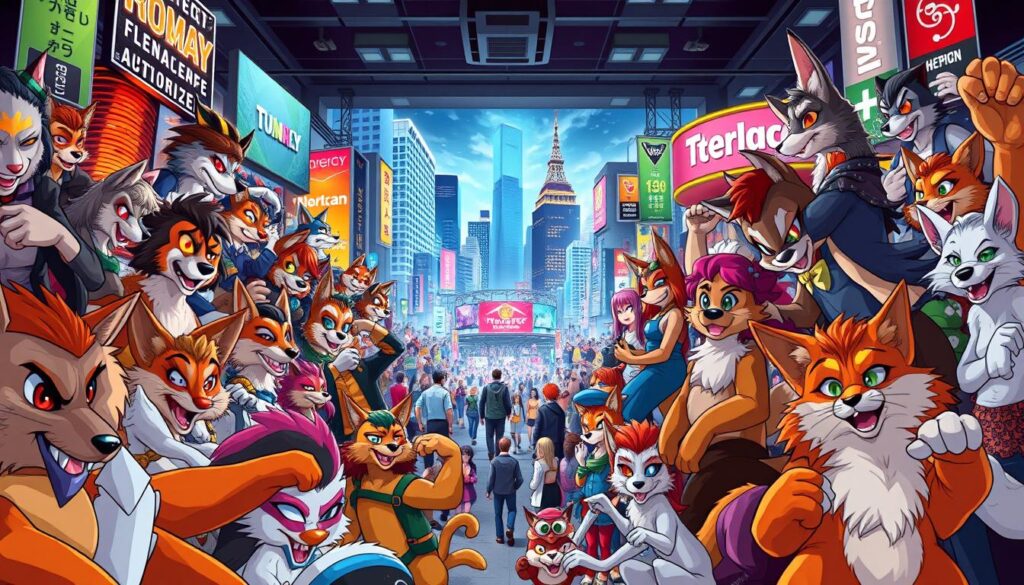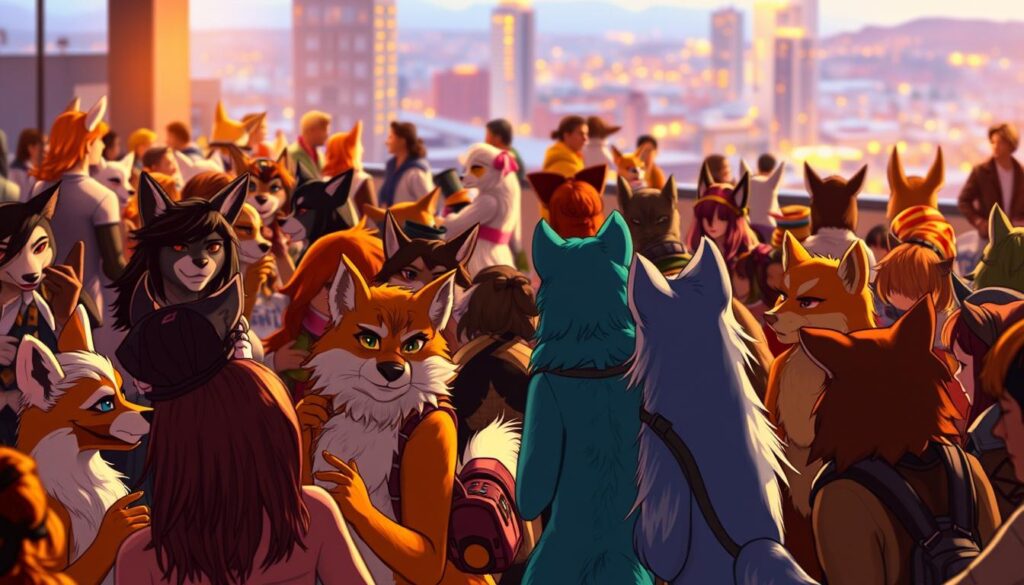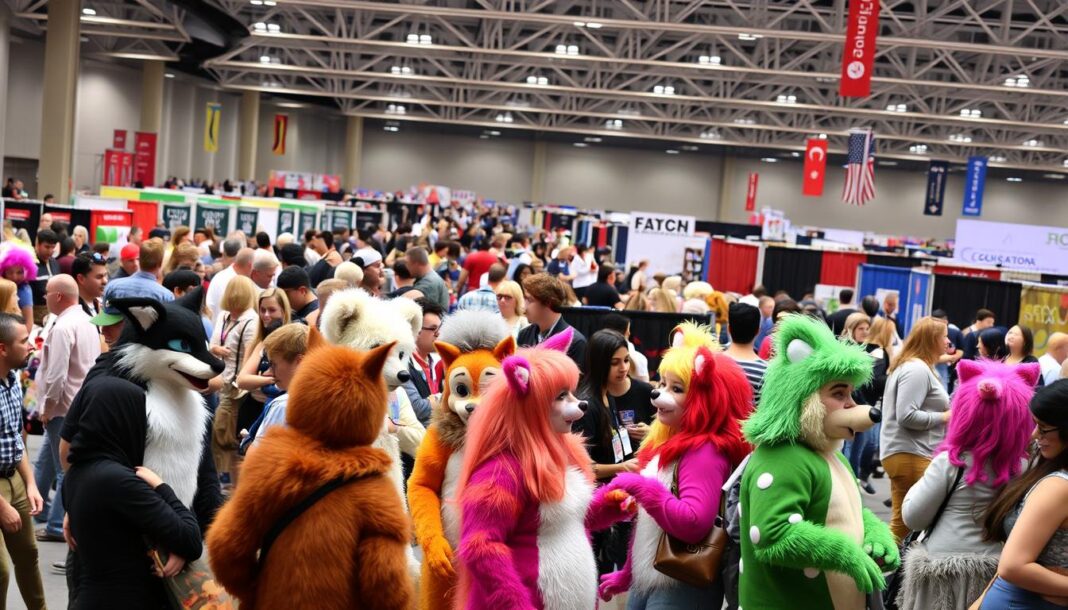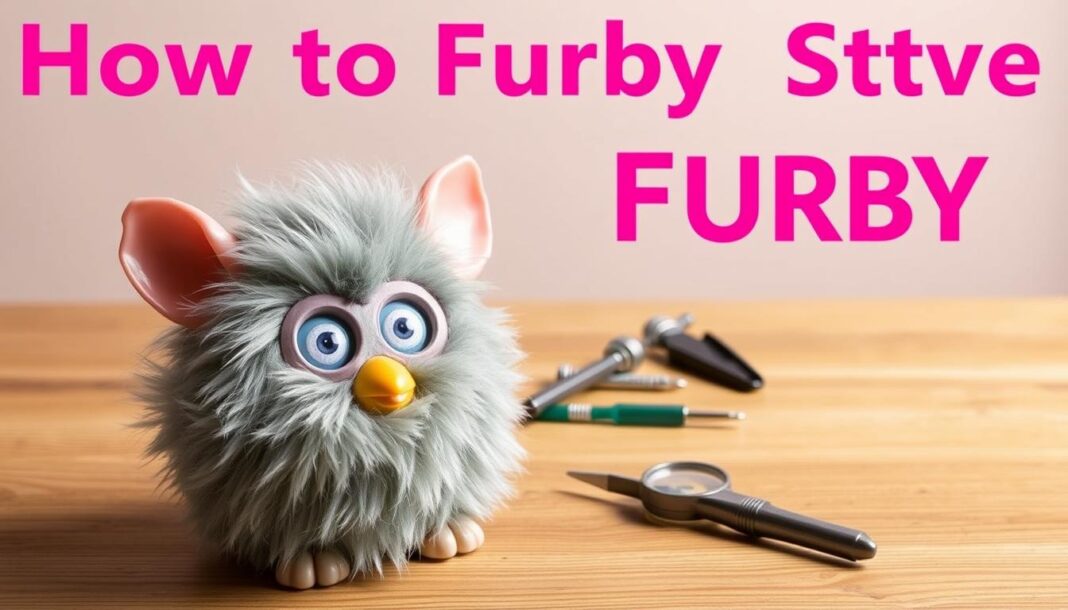Estimating the size of the furry fandom presents unique challenges. Unlike formal organizations, this community lacks centralized records, making precise counts difficult.
Recent research from FurScience suggests hundreds of thousands actively participate worldwide. Online hubs like Reddit and Fur Affinity provide glimpses into its expanding reach.
Major gatherings, including Anthrocon and Midwest FurFest, showcase steady growth. These events highlight the vibrant culture and connections within the group.
This article combines convention data, academic studies, and surveys to offer fresh insights into the community’s scale and diversity.
What Is the Furry Fandom?
Rooted in art and storytelling, this subculture celebrates human-animal hybrids. Members, often called furries, craft unique personas called fursonas to express creativity and identity. Dr. Samuel Conway, a leading voice, describes it as a “producer fandom”—focused on original content like art, costumes, and fiction.
Defining Furries and Their Interests
The community thrives on anthropomorphic characters—animals with human traits. Many create elaborate fursuits or digital art to bring their fursonas to life. SUNY Niagara research reveals 59.2% joined before age 18, showing early artistic engagement.
The Origins and Evolution of the Community
Emerging from 1980s sci-fi conventions, the fandom grew via early internet forums. Anime-inspired art styles and Usenet groups helped connect this group globally. Milestones like Anthrocon’s growth—from 500 attendees in 1997 to 9,000+ today—highlight its expansion.
Modern challenges include combating fringe movements, like the short-lived Furry Raiders. Yet, the culture remains resilient, blending creativity with inclusivity over 40 years.
How Many Furries Are in the World? The Latest Data
Quantifying the fandom’s size involves analyzing diverse data sources. Unlike traditional communities, participation ranges from casual enthusiasts to dedicated creators. Researchers combine convention records, surveys, and digital footprints to estimate global engagement.
Challenges in Estimating the Global Furry Population
No single website or organization tracks every member. Many participate anonymously or fluctuate in activity. Overlapping platforms—like artists on Fur Affinity and fans on Reddit—further complicate counts.
Virtual events add another layer. Pandemic-driven Zoom meetups retained 53% of typical convention attendance. This shift highlights the need for hybrid tracking methods.
Key Surveys and Research Findings
FurScience’s 2020 study found 51.1% commission art via Fur Affinity. SUNY Niagara’s research notes 47.8% use Twitter for furry content. These habits help gauge active involvement.
| Platform | Users | Primary Use |
|---|---|---|
| Fur Affinity | 1.2M registered | Art commissions |
| Reddit (r/furry) | 300K+ members | Discussions |
| Discord (Fursonafy) | 50K+ active | Real-time chats |
The Role of Online Communities in Tracking Numbers
YouTube creators (7.3% of furries) amplify visibility through video content. Meanwhile, furry-themed games and Discord servers foster niche interactions. These online spaces reveal trends beyond formal surveys.
For example, Fur Affinity’s growth mirrors convention attendance spikes. Such correlations help researchers refine estimates.
Furry Conventions as a Measure of Growth
Annual gatherings reveal the community’s evolving dynamics. Events like Anthrocon and Midwest FurFest track participation through badges, panels, and art sales. These metrics reflect broader trends in engagement and creativity.
Major Conventions and Their Attendance Records
North America hosts the largest events, with Anthrocon drawing 9,000+ members annually. Europe’s Eurofurence follows closely, averaging 3,500 attendees. Smaller regional meetups, like FurDU in Australia, highlight global reach.
| Convention | Location | Attendance (2023) |
|---|---|---|
| Anthrocon | Pittsburgh, USA | 9,200 |
| Midwest FurFest | Chicago, USA | 7,800 |
| Eurofurence | Berlin, Germany | 3,500 |
How Conventions Reflect Community Expansion
Rising attendance ties to social acceptance, particularly for LGBTQ+ members. Over 75% of partnered furries meet at these events. Charity auctions, like FCDF’s $1M+ annual raises, underscore the culture’s philanthropic spirit.
Niche subgroups also thrive. Babyfurs (7.1%) and military furs (3.3%) host dedicated panels. Challenges persist, such as 2017’s alt-right infiltration attempts. Yet, the community counters exclusion through inclusive activities and art-driven dialogue.
Regional Distribution of Furries Worldwide
The furry fandom spans continents, with distinct regional hubs shaping its global presence. Each area blends local culture with shared interests, creating unique subcommunities.
North America: The Largest Hub
North America dominates the scene, hosting mega-events like Anthrocon. Over 65% of FurScience respondents hail from the U.S. and Canada. Tight-knit local meets and online groups sustain year-round engagement.
Europe’s Vibrant Furry Scene
Europe thrives with a mix of conventions and art collectives. Eurofurence in Berlin draws 3,500+ attendees annually. The community leans into digital games and niche roleplay, reflecting broader creative trends.
Emerging Communities in Asia and Beyond
Asia’s growth is notable, with China representing 11.1% of surveyed furries. Japan’s kemono style merges anime and furry aesthetics. Furry Weekend Asia, launched in 2014, signals rising momentum.
Australia’s OzFurCon and similar events highlight Oceania’s 1.3% share. Despite censorship hurdles in mainland China, grassroots networks find way to connect globally.
Demographics of the Furry Community
Diversity defines the furry fandom, with members spanning age, gender, and cultural lines. This group thrives on creativity, blending artistic expression with unique identities. Surveys reveal insights into their lifestyles, from income levels to geographic distribution.
Age, Gender, and Sexual Orientation Trends
Over 75% of furries identify as LGBTQ+, with bisexual and pansexual members forming the largest subsets. SUNY Niagara’s research notes 45.5% are single, while 10.7% are married. Ages skew young, with 59.2% joining before adulthood.
Fursona Species Popularity
Wolves, foxes, and dragons top the list of favorite fursona species. Hybrid designs (e.g., wolf-dragon mixes) reflect personal storytelling. This creative life aspect strengthens bonds within the community.
Socioeconomic and Geographic Diversity
Racial disparities exist—78.6% identify as white, while 15.3% are East Asian. Efforts by POC furries aim to boost representation. Income levels vary: 64.1% are gamers, and 34.7% monetize art commissions.
| Demographic | Percentage | Key Fact |
|---|---|---|
| LGBTQ+ | 75% | Bisexual most common |
| Artists | 34.7% | Sell commissions |
| Urban Residents | 58% | Higher convention attendance |
Urban vs. rural divides show 42.5% enjoy sci-fi, while 31.8% prefer anime. These trends highlight the fandom’s ties to broader pop culture.
The Cultural Impact of Furries
Beyond fursuits and conventions, this group shapes pop culture in unexpected ways. Their influence spans art, media, and philanthropy, proving the community is more than a niche hobby.

Art, Media, and Creative Contributions
Furry artists dominate platforms like Fur Affinity, with 34.7% earning income from commissions. Animated series like Beastars and Aggretsuko reflect anthropomorphic storytelling’s mainstream appeal.
Independent creators also thrive. Podcasts such as FurCast and YouTube channels explore fandom activities, reaching audiences beyond the core people.
Charity Work and Social Initiatives
Generosity defines this way of life. Major events prioritize fundraising:
- Midwest FurFest raised $110K for FCDF in 2023.
- Anthrocon donates annually to local animal shelters.
After RainFurrest’s 2015 collapse, organizers adopted stricter policies. This shift improved event safety and transparency.
Mental health networks, like Furry Alliance, offer tailored support. Anti-bullying campaigns address members’ past struggles, making inclusivity a core part of the culture.
Furry Spending Habits and Economic Influence
The furry fandom fuels a thriving economy through creative spending and niche markets. Members channel passion into purchases—from custom art to elaborate costumes. This financial engagement supports artists, vendors, and events globally.
Commissioning Art and Fursuits
Lifetime spending on creative works averages $2,823 per person. Fursuits dominate budgets, with partial suits starting at $2,500. Artists on websites like Fur Affinity report 34.7% of income from furry commissions.
Niche markets thrive too. Collars average $78, while adult toys hit $540 among buyers. Limited-edition items spark frenzied sales, like Midwest FurFest’s sold-out auctions.
Convention Expenses and Merchandise
Travel costs add up fast. Attendees spend $629 per event on hotels, badges, and food. Over 53% join at least one convention yearly, with Anthrocon drawing 9,200+ visitors.
Merchandise sales reveal trends. Pins and patches outsell other items 3:1. Scalpers target rare fursuit slots, reselling spots for triple the price.
Younger fans prioritize games and digital content. Virtual meetups retain 53% of live attendance, proving hybrid events are here to stay.
Misconceptions and Challenges Facing Furries
Misunderstandings about the furry fandom persist despite its creative spirit. Media often reduces this group to caricatures, ignoring its artistic and social depth. Surveys reveal 76% of partnered furries credit the community with strengthening their relationships.

Media Stereotypes and Stigma
TV shows and news outlets frequently exaggerate fringe elements. The 2020 documentary Fursonas countered this by highlighting diverse member stories. Yet, stereotypes linger—like associating furries solely with adult content.
Extremist factions, such as the Furry Raiders, exploit these misconceptions. Their swastika-paw logo sparked backlash, prompting conventions to ban hate symbols. Such incidents underscore the fandom’s ongoing battle for accurate representation.
Online Harassment and Real-World Prejudice
The internet fuels both connection and risk. Prominent fursuiters like Telephone face doxxing—personal details leaked to incite harm. A 2023 FurScience study found 1 in 5 furries experienced targeted harassment.
| Challenge | Impact | Support Response |
|---|---|---|
| Doxxing | Privacy breaches | Legal aid networks |
| Cyberbullying | Mental health strain | Furry Alliance Discord |
| Convention bans | Exclusion | Policy reforms |
Mental health servers offer safe spaces, with 62% of users reporting reduced isolation. This blend of creativity and resilience defines furry life—a fact often lost in sensational headlines.
The Role of Technology in the Fandom’s Growth
From early forums to VR chatrooms, tech shapes every facet of this artistic subculture. Over the years, digital tools have transformed how members create, connect, and celebrate their interests.
How the Internet Shaped Furry Culture
Usenet groups in the 1990s laid the groundwork for today’s global networks. Platforms like Fur Affinity became hubs for art trades, while Reddit fostered discussions. By 2023, 7.3% of furries identified as YouTube creators, amplifying the community’s visibility.
Debates over AI-generated art sparked controversy. Fur Affinity’s 2023 ban reflected tensions between innovation and artistic integrity. Yet, these clashes highlight the fandom’s adaptability.
Virtual Reality and Future Innovations
VRchat worlds like Furry Night Club redefine social activities. At Furnal Equinox 2024, fursuiters demoed motion-captured avatars, blending physical and digital expression.
- Hologram suits could enable remote convention appearances.
- Anthro City in VRchat hosts 500+ nightly users.
As technology evolves, so does the way furries engage—proving this fandom thrives on the cutting edge.
Furry Fandom and Identity
Identity and belonging form the core of furry culture. Members craft unique personas, blending creativity with personal expression. This community thrives on inclusivity, offering a safe space for diverse voices.
Fursona Creation and Personal Expression
Fursonas act as extensions of self, often reflecting inner traits or aspirations. Wolves and foxes dominate, but hybrids like dragon-cats showcase individuality. Over 58% of furries update their designs yearly, mirroring personal growth.
Art fuels this way of life. Platforms like Fur Affinity host 1.2M artists, with 34.7% earning income from commissions. Neurodiversity flourishes here—42.5% enjoy sci-fi, while 31.8% prefer anime aesthetics.
Community Support and Inclusivity
The Furry Alliance Network leads anti-bullying campaigns, addressing past harassment. POC furries push for diverse convention panels, challenging the 78.6% white demographic.
- Relationships: 76.7% of couples meet through the fandom.
- Growth: 58% plan deeper involvement in coming years.
- Safety: Mental health Discords report 62% lower isolation rates.
From fursuits to fanfiction, this group redefines belonging. Their stories prove identity isn’t static—it’s a canvas waiting for color.
The Future of the Furry Fandom
Sustainability and tech will redefine furry culture in coming years. Experts predict 2-3 million active members globally by 2030, fueled by Gen Z’s embrace of creative interests.
Eco-friendly fursuit materials gain traction, aligning with climate concerns. Meanwhile, AI sparks debate—threatening artists yet empowering indie creators with affordable tools.
Mainstream collaborations loom, like rumored Disney+ documentaries. Such projects could shift perceptions, but stigma persists. The community counters this through education and outreach.
From VR meetups to global charity drives, the furry fandom evolves while staying true to its core—a world where art and belonging thrive.

